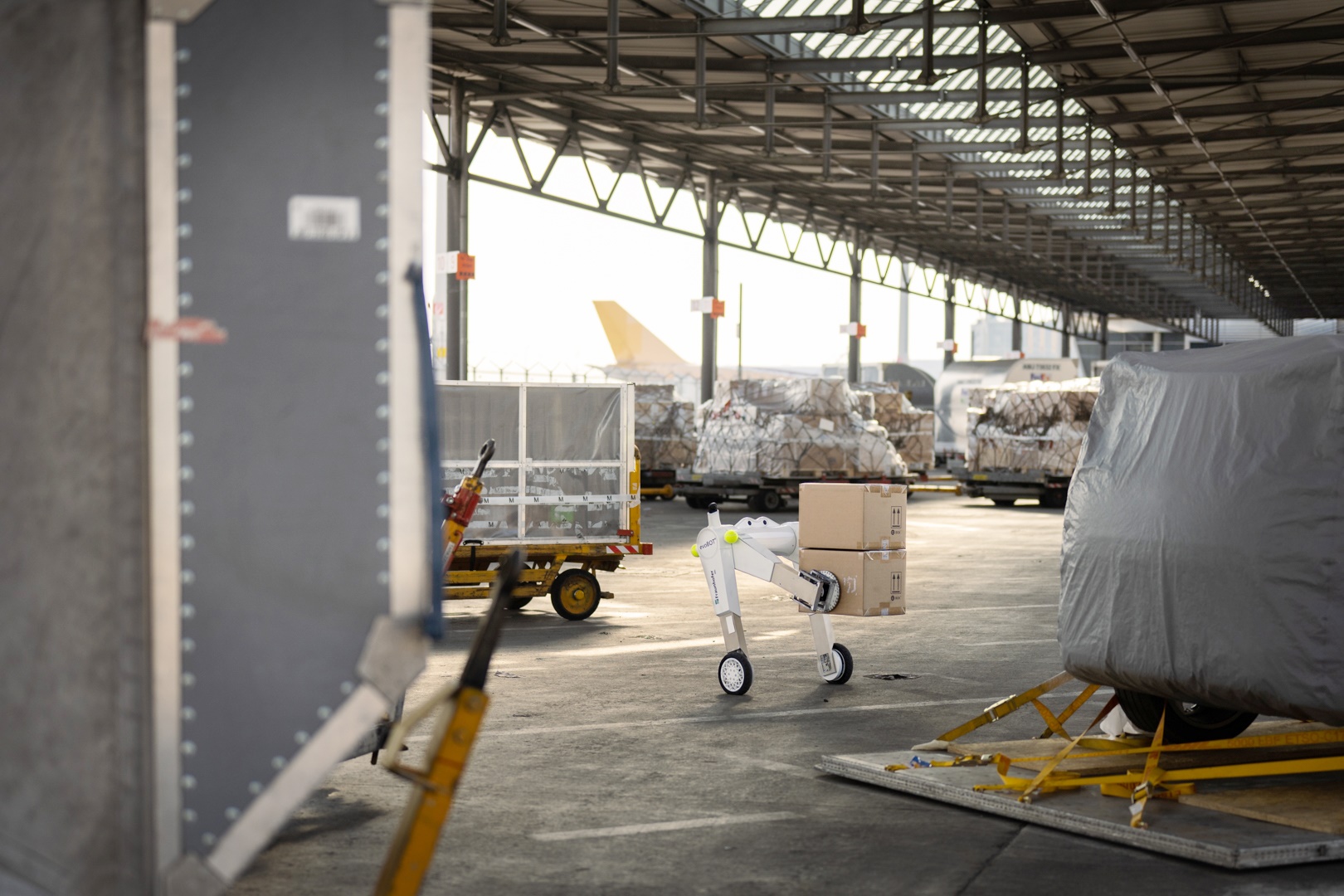 evoBOT_Fraunhofer. Foto: Fraunhofer IML/Sebastian Beierle
evoBOT_Fraunhofer. Foto: Fraunhofer IML/Sebastian Beierle
Autonomous vehicles and robots will significantly shape the future of air freight in times of a shortage of skilled workers. A foretaste of this is provided by the “evoBOT” developed at the Fraunhofer Institute for Material Flow and Logistics IML: The robot on two wheels with gripper arms, which always remains in balance, mastered an initial practical test in the cargo terminal and on the apron of Munich Airport.
Air freight is currently undergoing a profound transformation: Despite a shortage of skilled workers, high throughput rates have to be managed, while digitalization is advancing at an ever faster pace. The “evoBOT” offers an initial response to this development. During its first test runs at Cargogate at Munich Airport, the autonomous robot proved how versatile it is. “The development and expansion of the cargo and logistics sector are essential components of our corporate strategy. We welcome every initiative to optimize and digitalize handling processes. The evoBOT will facilitate the daily work of our colleagues in the cargo area and make the workplace more attractive,” explains Jost Lammers, CEO of Flughafen München GmbH.
“Our evoBOT is the beginning of a new population of autonomous vehicles and robots. With its arms and its locomotion on two wheels, it points to the humanoid future of robotics. The practical test now carried out at Munich Airport impressively underpins the potential of this development. The evoBOT can become a real colleague for the workforce in a wide range of applications,” emphasizes Prof. Michael ten Hompel, Executive Director of Fraunhofer IML.
The dynamically stable transport robot developed by Fraunhofer IML is characterized in particular by its arms and the adaptive load pickup made possible by them. It can take on a wide range of tasks such as handling hazardous goods, transporting parcels for longer recurring distances, relieving employees of lifting and overhead work, procuring materials or even assisting with the loading and unloading of aircraft. Despite this load capacity, the “evoBOT” is enormously maneuverable on its two wheels. It can reach a maximum speed of up to 60 km/h and transport a payload of up to 100 kg. It can operate either alone or in a swarm. Its stable driving characteristics make it possible to operate theevoBOT in various areas, both indoors and outdoors. Its low carbon footprint also contributes to its versatile use.
“Against the backdrop of increasing air cargo numbers and the challenges of employee acquisition, we are very pleased to be able to take a look into the future with Fraunhofer IML. Into the near future,” adds Claudia Weidenbusch, Managing Director of Cargogate Munich Airport GmbH.The Digital Testbed Air Cargo (DTAC), in the context of which the current test was conducted, and the initial development of evoBOT are funding programs of the German Federal Ministry of Digital Affairs and Transport (BMDV). In addition to Cargogate Munich Airport GmbH and Fraunhofer IML, the DTAC project consortium includes nine other partners from research and industry: CHI Deutschland Cargo Handling GmbH, Flughafen Köln/Bonn GmbH, Frankfurt University of Applied Sciences, Fraport AG Frankfurt Airport Services Worldwide, Lufthansa Cargo AG, LUG aircargo handling GmbH, Mitteldeutsche Flughafen AG, Schenker Deutschland AG and Sovereign Speed GmbH. Further information on the progress of the project and the other projects of the Digital Test Field Air Cargo can be found at: www.digitales-testfeld-air -cargo.de; www.munich-airport.de
This and other articles on the topic of electromobility and autonomous driving can be found in the current eMove360° magazine. Order a free download PDF or the print version in the store.